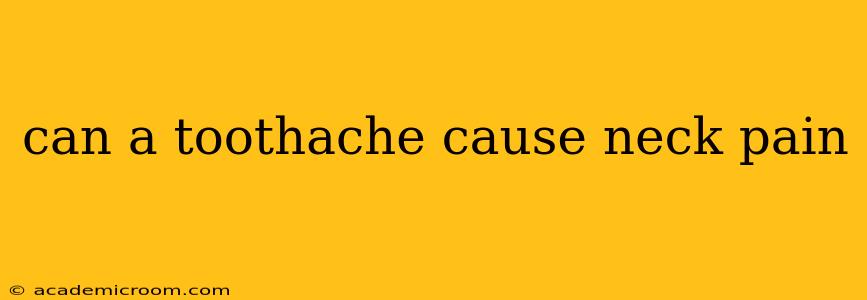A toothache, that throbbing, agonizing pain in your mouth, is unpleasant enough on its own. But did you know it can sometimes radiate to other areas, even causing neck pain? While not always the case, there's a definite connection between the two, and understanding why is crucial for proper diagnosis and treatment. This article will explore the link between toothaches and neck pain, answering common questions and offering insights into potential causes and solutions.
How Can a Toothache Lead to Neck Pain?
The connection between a toothache and neck pain often stems from the intricate network of nerves and muscles in your head and neck. Your jaw muscles, temporomandibular joint (TMJ), and neck muscles are all interconnected. When experiencing intense tooth pain, you might unconsciously tense these muscles, leading to pain and stiffness in your neck and shoulders.
Think of it like this: a persistent, sharp toothache can trigger a protective response, causing you to clench your jaw or adopt unusual postures to alleviate the pain. This prolonged muscle strain translates into neck pain, often felt on the same side as the affected tooth.
What Other Symptoms Might Accompany Toothache-Related Neck Pain?
Besides the obvious toothache and neck pain, you might experience other symptoms depending on the underlying cause. These can include:
- Jaw pain and stiffness: This is a common symptom related to TMJ dysfunction often associated with toothaches.
- Headaches: Tension headaches can develop due to prolonged muscle tension from a toothache.
- Earache: Pain can radiate to the ear, especially with infections or abscesses.
- Facial swelling: This suggests a more serious infection that requires immediate dental attention.
Can a Tooth Infection Cause Neck Pain?
Yes, a severe tooth infection (abscess) can definitely lead to neck pain. An abscess is a pocket of pus caused by bacteria, and if left untreated, the infection can spread to surrounding tissues, including those in the neck. This spread can result in significant neck pain, swelling, and even fever. This is a medical emergency and requires immediate dental attention.
Is Neck Pain Always Caused by a Toothache?
No, neck pain isn't always a direct result of a toothache. Many other factors can cause neck pain, such as poor posture, muscle strain, injuries, and underlying medical conditions. It's essential to distinguish between toothache-related neck pain and other forms of neck pain through proper examination by a dentist and potentially other healthcare professionals.
When Should I See a Doctor or Dentist?
If you're experiencing neck pain accompanied by a toothache, it's crucial to seek professional help. Here's when you should seek immediate attention:
- Severe pain: Intense pain that doesn't respond to over-the-counter pain relievers.
- Swelling: Noticeable swelling in your face or neck.
- Fever: A high fever could indicate a serious infection.
- Difficulty swallowing or breathing: These are serious symptoms requiring urgent medical attention.
How is Toothache-Related Neck Pain Treated?
Treatment depends on the underlying cause. A dentist will address the toothache, potentially with root canal treatment, extraction, or antibiotics for infections. Managing the associated neck pain may involve:
- Over-the-counter pain relievers: Ibuprofen or acetaminophen can help manage pain and inflammation.
- Muscle relaxants: In severe cases, a doctor may prescribe muscle relaxants.
- Physical therapy: This can help improve neck mobility and reduce muscle tension.
- Heat or ice packs: Applying heat or ice can provide temporary relief.
In conclusion, while a toothache can indeed cause neck pain through various mechanisms, it's crucial to consult a dentist or doctor for proper diagnosis and treatment. Ignoring the issue can lead to more significant complications. Understanding the connection between these two types of pain empowers you to seek timely medical attention and effectively manage your discomfort.
